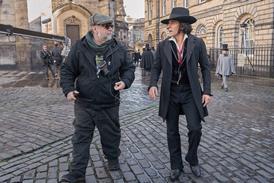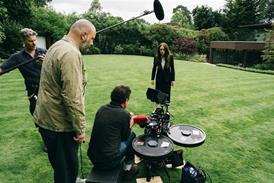The Fantastic Fest world premiere is a Danish crime thriller that offers a big scale and more complex topics than the first film in the Department Q series, The Keeper of Lost Causes.
Mikkel Norgaard’s The Keeper of Lost Causes was a character-driven crime thriller with a somewhat claustrophobic feel, with the story of a woman kidnapped by a psychopath and held hostage in a pressure chamber.
Now the follow-up film The Absent One (premiering this week at Fantastic Fest) is anything but claustrophobic, offering a huge scale thriller covering different decades, iconic locations and some of society’s larger problems of power and privilege.
“The novel (Fasandræberne) is much bigger in scope it goes into a total new environment compared to the first one. That was one of the things I really enjoyed about doing this one, I knew with this film we could really open up the universe and bring that big scope to it,” the director tells Screen.
The Keeper of Lost Causes was a huge hit in Denmark, but it wasn’t that film’s success that inspired Norgaard to take on the sequel. In fact, he’d already shot The Absent One by the time the first time became a hit.
Both films are adapted from Jussi Adler-Olsen’s bestselling Department Q novels, about two mismatched detectives (played in both films by Nikolaj Lie Kaas and Fares Fares) solving cold cases. The new cast for The Absent One also includes Danica Curcic, Pilou Asbaek and David Dencik.
This story, set in the 1990s and today, is about the detectives looking into upper class boarding school students who might have been involved in a killing when they were teenagers, and who now are the influential leaders of society. The novel — adapted by Nikolaj Arcel and his frequent collaborator Rasmus Heisterberg.
“There is something fascinating about boarding schools, something mystical about it. This closed environment with its own rules,” says Norgaard, who adds that he had always wanted to make a film set in boarding school.
It tackles huge themes of sex, power and violence. And “this network that is in our society in all different levels, that we use to position ourselves.”
The film achieves enormous scale with a modest budget that is akin to what Lost Causes had. “We had so many locations, so many sets, and big builds. For a Danish film it’s quite something,” he says.
The film, like Lost Causes, is produced by Louise Vesth for Zentropa Productions. It had a budget of about $7m (DKK40m). Zentropa’s partners on the project include TV2 Denmark, ZDF German Television Network, ZDF Enterprises, TV2 Norway, Film i Väst. Supporters include the Danish Film Institute, Eurimages, Filmförderung Hamburg Schleswig-Holstein, Deutsche Filmförderfonds and the EU’s MEDIA Programme. TrustNordisk again handles sales.
The Absent One shot for a total of 10 weeks, in both Denmark and in Germany. There was a lot more location work than in the first film. “We knew from the beginning we wanted this to have much greater scale and scope and make it a really cinematic approach. We knew if we could pull it off that it would give the film so much more value to have all these environments.”
There is one scene in particular, on a basketball court, that takes the violence and aggression to a disturbingly repetitive stage. “That’s the point,” he says of ‘going too far.’ “This is a key scene – it’s about going past that point that people think is enough. It’s someone who doesn’t just stop. I think he’s throwing it too much too, he’s not stopping when you should stop, that’s what in this character.”
Working with a younger cast, who were ages 19-22, not the younger teenagers they play on screen, also had to be handled delicately. There were workshops, and they spent time together alone in a summerhouse just hanging out. And then “the first week of shooting was doing the whole boarding school section in Germany. For that period of 10 days it was just us, the rest of the film didn’t exist. It was almost making a film inside a film. And then we did the rest….We could process the things we were doing together while we were doing them. That was great for all of us.”
After making two crime thrillers, Norgaard is now ready for some clowning around. “This is the right time to take a break and have fun,” he says, smiling. Norgaard plans to shoot the second Klown film in Denmark and the US starting in October, as Caspar and Frank hit Los Angeles. The trio – Norgaard, Frank Hvam and Casper Christensen — are working on the script now. “The relationship between Casper, Frank and myself is something special and we should try to hang on to that,” he says.
The Absent One continues screening this week at Austin’s Fantastic Fest.























No comments yet